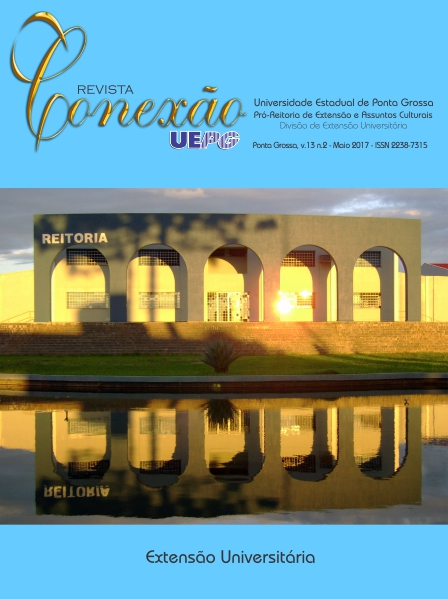EDUCATIONAL TECHNOLOGY FOR YOUTH AND ADULT EDUCATION IN SCHOOLS OF AMAZONIA: POTENTIATING TEACHERS’ PRACTICES
DOI:
https://doi.org/10.5212/Rev.Conexao.v.13.i2.0006Keywords:
teacher education, educational technologies, youth and adult education.Abstract
The experience report about educational technologies for youth and adult education in teacher education derives from the outreach project “Technology in schools: an instrument for teachers of schools located near the riverside of Cametá” which is linked to the assistance program for methodological intervention - PAPIM (Brazilian abbreviation), supported by the Office of Outreach Affairs of Federal University of Pará (UFPA). The workshop was carried out at the elementary school Izabel Fernandes dos Santos for the teachers responsible for youth and adult education – EJA (Brazilian abbreviation). It sought to reflect on their practices in order to add a new dimension to it through the pedagogical use of educational technologies. It demonstrated that the use of technologies, as teaching resource, may change teachers’ pedagogical practices. However, there is still no infrastructure and specific training in schools to include it in teachers’ practice.
Downloads
References
APPLE, Michael W. Trabalho Docente e textos: Economia Política das Relações de classe e de Gênero em Educação. Trad.: Michael W. Apple, Thomaz Tadeu da Silva, Tina Amado, Vera Maria Moreira. São Paulo: Artes Médicas, 1995.
ARROYO, Miguel. A Educação de Jovens e Adultos em tempos de exclusão. In: BRASIL. Construção Coletiva: contribuições à Educação de Jovens e Adultos. Brasília: MEC; UNESCO, 2006. (Coleção Educação para Todos).
BARCELOS, Valdo. Educação de Jovens e Adultos: currículo e práticas pedagógicas. Petrópolis, RJ: Vozes, 2010.
BRASIL. Ministério da Educação. RECOMEÇO: Supletivo de Qualidade. Programas e Ações para a Educação de Jovens e Adultos. Brasília, DF: 2001.
______. Parecer nº 699/71. Regulamenta o capítulo IV da Lei 5.692/71. 06 de julho de 1972. Constituição Federal de Educação. Rio de Janeiro.
CALDART, Roseli Salete. Por Uma Educação do Campo: traços de uma identidade em construção. In: KOLLING, Edgar Jorge; CERIOLI, Paulo Ricardo; CALDART, Roseli Salete (Orgs.). Educação do Campo: Identidades e Políticas Públicas. Brasília, DF. Articulação Nacional Por Uma Educação do Campo, 2002. (Coleção Por Uma Educação do Campo, nº 04).
CYSNEIROS, Paulo Gileno. Novas tecnologias na sala de aula: melhorias do ensino ou inovação conservadora? Revista Informática educativa, v.12, n.1, p. 11-24, 1999.
HAGE. Salomão Mufarrej. Políticas de Nucleação e Transporte Escolar: construindo indicadores de qualidade da educação básica nas escolas do campo da Amazônia. Relatório final de Pesquisa, Belém, 2010. (Mimeo).
HERNÁNDEZ, Fernando; SANCHO, Juana Maria. A Formação a partir da experiência vivida. Pátio, Porto Alegre, Artmed, n. 40, nov./jan. 2006-07.
SCHEIBEL, Maria Fani; LEHENBAUER, Silvana (Org.) Saberes e Singularidades na Educação de Jovens e Adultos. Porto Alegre: Mediação, 2008.
SUBTIL, Maria José Dozza. Tecnologia e meio comunicacionais na educação: a necessária reflexão sobre formação e trabalho docente. Revista HISTEDBR On-line, Campinas, SP, n. 52, p. 402-415, set. 2013. Disponível em: <https://www.fe.unicamp.br/revistas/ged/histedbr/ article/view/5589 >. Acesso em: 18 set. 2014.
Downloads
Published
Issue
Section
License
a) Authors retain copyright and grant the journal right of first publication with the work simultaneously licensed under a Creative Commons Attribution License that allows others to share the work with an acknowledgement of the work's authorship and initial publication in this journal.
b) By submitting an article to the Revista Conexão UEPG and having it approved, the authors agree to assign, without compensation, the following rights to the Journal: the rights of first publication and the rights to redistribute the article and its metadata to the indexing and reference services that the editors deem appropriate.
c) Readers are free to transfer, print out and use the articles published in the Journal, as long as there is always explicit mention to the author(s) and to the Revista Conexão UEPG and as long as there is no alteration of the original work. Any other use of the texts needs to be approved by the author(s) and by the Journal.






